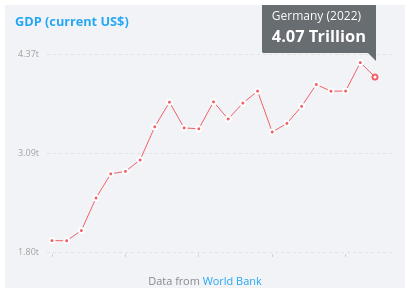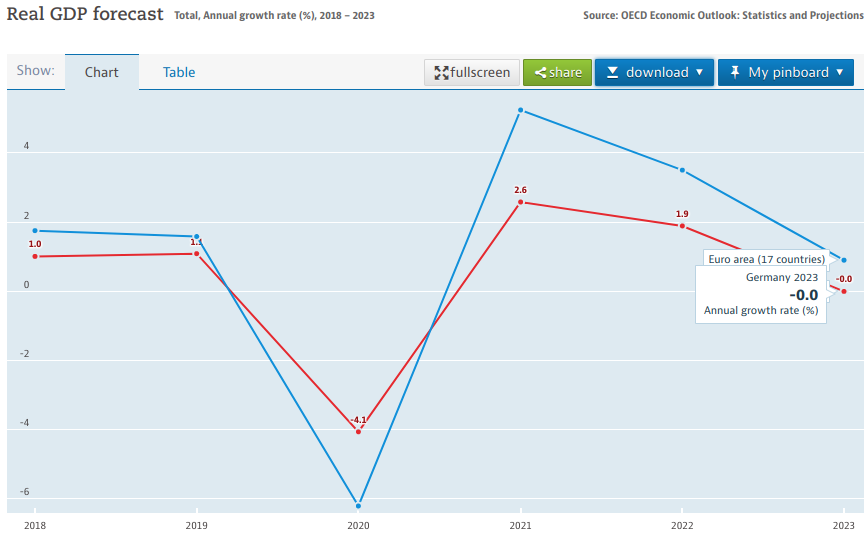Germany's GDP in 2022 was 4.07 Trillion Dollar according to the Worldbank:

Resolves to the range the Worldbank publishes for 2023 in Trillion Dollars. Lower boundary included. Upper boundary excluded.
🏅 Top traders
| # | Trader | Total profit |
|---|---|---|
| 1 | Ṁ591 | |
| 2 | Ṁ140 | |
| 3 | Ṁ103 | |
| 4 | Ṁ84 | |
| 5 | Ṁ66 |
People are also trading
The link in the description has a restricted date range with end=2022, so it doesn't show the newer data. If you pull the slider one step to the right, it shows up. Or just remove the parameter from the link https://data.worldbank.org/indicator/NY.GDP.MKTP.CD?contextual=default&locations=DE&start=2000&view=chart
Not World bank but
The official estimate for Germany's GDP was $4.509 trillion at the end of 2023 in puchasing power partity terms.
https://www.worldeconomics.com/Country-Size/Germany.aspx#:~:text=Germany's%20Gross%20Domestic%20Product%20(GDP)&text=The%20official%20estimate%20for%20Germany's,in%20puchasing%20power%20partity%20terms.
(You would think they should know how to spell purchasing 🤣 )
Preliminary DeStatis numbers have the GDP at 4.121 Trillion € ~4.512 Trillion $. Better estimate to be released on January 30th, detailed results on Feb 23rd.
https://www.destatis.de/EN/Themes/Economy/National-Accounts-Domestic-Product/Tables/gdp-bubbles.html
@Gideon37 Eur/USD at end of year was 1.1036
Will they use that rate to convert?
=4.458 ? still same bracket but maybe the other looks more attractive this way.
Sorry transposition error, the calc comes to 4.548
@ChristopherRandles That is indeed an important question. DeStatis usually publishes € numbers. I guess it depends on @marktwse‘s resolution then.
@ChristopherRandles Also you probably meant to write 4.548, right? Was confused why you were saying same bracket.
@Gideon37 Fixed post, thanks and sorry for error and confusion. There might be other ways it could be done eg Jan GDP at end Jan rate Feb GDP at end Feb rate ...
@ChristopherRandles Resolves according to WorldBank not Destatis. That was probably not a great choice, but that is what I wrote in the description. I'll extend the close date into February.
@SoniaAlbrecht 4.5 is the upper boundary of "4.4-4.5" and thus excluded. It resolves to "Other".
I just created "4.5-4.6". Maybe that is a little clearer. Now 4.5 resolves to this new answer, of course.
Fun question. Seems like 3 aspects of this:
1 real GDP growth - Expectation seems to be 0.1% contraction
2 Inflation 3.3% expectation
3 Conversion of GDP from Euro to Dollars. Euro possibly worth more $ through 2023 than through 2022 maybe by a couple of % but really unsure of this one - is it exchanged throughout year or just at rate at end of year, in which case 1.1/1.07 ?
-0.1+3.3+3=6.2%
4.08 plus 6.2% = ~4.33
So I might put $4.3-4.4T as my most likely range but suspect I could be wrong about lots here so not betting much.
@ChristopherRandles Ah thought I was doing something or several wrong.
Inflation +5.9% on an annual average in 2023 compared with 2022 (provisional)
That makes more sense making 4.4-4.5 the most likely range.
@marketwise Thanks! Though now I've realized I don't understand how splitting new answers out of "other" works. How did "4.3-4.4" and "4.4-4.5" end up with different probabilities despite apparently identical positions? Did you get to decide on a ratio for the split?
@Yorwba I'm not sure either. I decided nothing. Just payed a 25M per answer for additional liquidity.
A difference in probabilities makes sense though. When adding the second answer, there is already the first answer taking some percentage points.
@marketwise After spending way too long on this question, I'm now convinced that:
1. adding new answers one-by-one cannot ensure they all have the same probability without potentially messing with the probabilities of earlier answers.
2. the procedure for calculating the probabilities after adding an answer is very complicated: https://github.com/manifoldmarkets/manifold/blob/3c2fb4ad26ac509452c673896a551671198bfdd9/backend/api/src/create-answer-cpmm.ts#L186C1-L186C1
